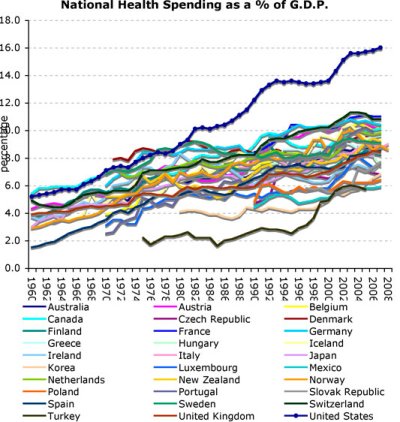DoingHomework
Recycles dryer sheets
- Joined
- May 28, 2010
- Messages
- 254
I think your numbers are off. We spend more than 51% more than the next highest country which is Norway, and about 90% more than Canada and nearly 100% more than France.
I agree, we as a population are over weight and that is definitely a factor.
I don't think anyone would argue that. The poorest population are generally the most obese, and the wealthier Americans are the most fit (as a rule - not always) I think there is a direct correlation to income and intellect and being fit or obese. If you have traveled to other countries, you will see some significant differences in their eating habits, and food available.
We are the Fast Food capital of the world, and the general accepted diet for Americans is not exactly healthy. But our government does not seem willing to promote better eating. Look at the problem they are having with the school lunches, and the critisism Michele Obama got when she planted her garden and advocated eating more vegetables. Yes, it is not our government's job to take care of our health, but it wouldn't hurt for them to participate in some education.
I don't know what percentage to allocate to this fact. I don't know where you came up with your 3%. I concur, it is a factor, but how much I don't know. Certainly not attributing to 50-100% increase.
My numbers might be off. They came from the Kaiser Family Foundation. I have no idea what, if any, bias they have. But numbers were % of GDP. I don't think it is even possible that we spend double what a European country does. So, I might have an error in numbers but I am confident that simply improving the efficiency a little bit could go a long way toward fixing the system.
I lived in a European country that was quite socialist, many Americans believed they were communist. This was about 30 years ago. They had great, free health care. I went to the doctor there and here in the US and I knew others that had more major problems. Their system was better than ours in almost any measurable way. I'm not sure if it still is but I do know, because I still go back and have some ties with that country, that anyone who says that our care is much better is mistaken. Developed countries everywhere have the most modern medical care. You have access to the technology, drugs, and care you need. I think our care is equal but not better.
But in the country I am familiar with, the cost has gone up. "Free" care now involves expensive copays, higher taxes, and other charges that rival or exceed what we pay here in the US if we have insurance. That's enough to make people get the routine care they need but avoid unnecessary tests and procedures. A friend had here wisdom teeth out a few years ago about the same time I did. We compared costs and out out-of-pocket was about the same even though hers was supposedly "free."
As for the fast food comment, I totally agree. When/where I lived in Europe it was unusual to see a fat person. When you did it was usually just a little overweight. And it was always middle-aged or older people. When I go back now I see a lot of obesity. And I see a lot of fat kids which was never seen 30 years ago. It is really sad.
When I talk with friends there about it they tend to blame the lifestyle changes rather than fast food. The "traditional" diet has been replaced with a lot of quick, packaged food, not necessarily fast food but unhealthy garbage of any type.

